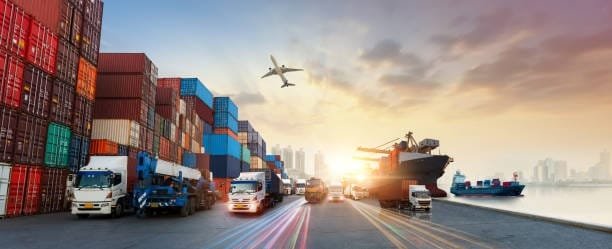In a world that spins faster than ever before, where the demands of consumers evolve at a breathtaking pace, the realm of global logistics emerges as a silent powerhouse driving the engine of trade. Imagine a labyrinth of networks, routes, and systems that seamlessly transport goods across vast distances, ensuring that what you order online today arrives at your doorstep tomorrow. The intricate dance of logistics not only facilitates international trade but also shapes the very fabric of our global economy. As businesses grapple with an increasingly interconnected marketplace, understanding the dynamics of global logistics has never been more crucial.
The Heartbeat of International Trade
At its core, global logistics is the backbone of international trade. It encompasses a wide array of processes, from transportation and warehousing to inventory management and distribution. As economies continue to intertwine, the logistics industry evolves, integrating sophisticated technologies and methodologies to keep pace with the demands of the modern consumer. Companies no longer operate in silos; instead, they rely on a complex web of partners and service providers that collectively create a robust supply chain ecosystem.
One of the primary challenges businesses face in this environment is the need for speed. In an era dominated by e-commerce, where instant gratification reigns supreme, customers expect quick delivery times. Companies are now compelled to rethink their logistics strategies, implementing solutions that not only enhance efficiency but also improve customer satisfaction. The rise of same-day delivery options and automated fulfillment centers are just a glimpse into how businesses are adapting to meet these demands.
The Role of Technology in Transformation
Technology is the catalyst driving change in the logistics sector. The emergence of advanced tools, such as artificial intelligence (AI), machine learning, and the Internet of Things (IoT), has revolutionized how logistics companies operate. These technologies enable organizations to analyze vast amounts of data, optimize routes, predict demand, and improve overall operational efficiency.
Consider the impact of real-time tracking systems. With GPS-enabled devices, businesses can monitor shipments at every stage of the journey, from the moment they leave the warehouse to their arrival at the customer’s doorstep. This transparency not only enhances operational efficiency but also builds trust with consumers, who can follow their orders every step of the way.
Moreover, AI-driven algorithms are becoming indispensable in logistics. By analyzing historical data and identifying patterns, these systems can forecast demand, allowing businesses to adjust their inventory levels accordingly. This predictive capability helps prevent stockouts and overstock situations, ultimately leading to cost savings and improved service levels.
Navigating Challenges in Global Logistics
While the advancements in technology and strategies are exciting, they do not come without challenges. The logistics landscape is fraught with potential obstacles that can disrupt the flow of goods. Geopolitical tensions, natural disasters, and global pandemics have all demonstrated how vulnerable supply chains can be to unexpected shocks.
The COVID-19 pandemic, for instance, brought to light the fragility of global logistics networks. With lockdowns and restrictions in place, many businesses struggled to adapt to sudden changes in demand and supply disruptions. Companies that had not previously invested in technology or agile logistics practices found themselves at a disadvantage, unable to pivot quickly to meet the challenges presented by the crisis.
To combat these challenges, businesses are increasingly focusing on building resilience into their supply chains. This involves diversifying suppliers, exploring alternative shipping routes, and implementing risk management strategies that allow for rapid response to disruptions. The logistics industry must evolve continually, adopting new approaches to ensure that it can withstand the unpredictable nature of global trade.
Sustainability: The New Frontier
As the logistics industry adapts to new realities, a growing emphasis on sustainability is reshaping its future. Environmental concerns are no longer an afterthought; they have become central to the strategic decisions made by logistics providers. With rising consumer awareness and regulatory pressures, companies are under increasing scrutiny to adopt sustainable practices throughout their supply chains.
From reducing carbon footprints to optimizing transportation routes for maximum efficiency, the logistics sector is finding innovative ways to operate more sustainably. The shift towards electric vehicles and alternative fuels is gaining momentum, and many logistics companies are investing in green technologies to minimize their environmental impact.
Furthermore, sustainable packaging solutions are becoming a priority. Businesses are rethinking how products are packaged, opting for materials that are recyclable or biodegradable. This commitment to sustainability not only benefits the planet but also resonates with consumers who are increasingly making purchasing decisions based on a company’s environmental practices.
The Future of Global Logistics: A Vision Ahead
Looking forward, the global logistics industry is poised for even more transformation. As e-commerce continues to flourish, businesses will need to further innovate to keep pace with changing consumer behaviors. The rise of omnichannel retailing—where customers interact with brands through various channels—requires logistics solutions that can adapt to diverse fulfillment needs.
Imagine a world where drones deliver packages to urban areas, where autonomous vehicles navigate highways, and where AI-driven platforms manage supply chains with unprecedented efficiency. These advancements are no longer confined to the realm of science fiction; they are quickly becoming a reality. Companies that embrace these technologies will gain a competitive edge, positioning themselves as leaders in the evolving logistics landscape.
The Importance of a Trusted Logistics Partner
In this intricate world of logistics, partnering with a reliable global logistics provider can make all the difference. A seasoned logistics partner brings invaluable expertise and resources to the table, enabling businesses to navigate the complexities of international trade with confidence. Whether it’s handling customs clearance, optimizing shipping routes, or managing warehouse operations, a trusted partner can enhance efficiency and drive growth.
When selecting a logistics partner, consider factors such as their global reach, technological capabilities, and commitment to sustainability. A partner that shares your values and understands your unique challenges will be instrumental in achieving your logistics goals.
Conclusion: Embrace the Evolution of Logistics
As we navigate the future of global logistics, it is clear that this industry is more than just a means of moving goods; it is a critical component of the global economy. With technology as a driving force, businesses must adapt and innovate to meet the demands of an ever-changing landscape. By embracing sustainability, building resilience, and forging strategic partnerships, companies can thrive in this dynamic environment.
The journey of global logistics is an ongoing adventure, one that holds immense potential for those willing to embrace change. As we move forward, the possibilities are limitless. The future of logistics is bright, and it beckons with opportunities for businesses ready to take the plunge.



